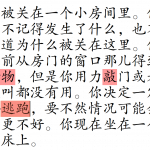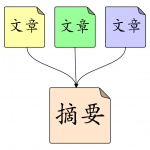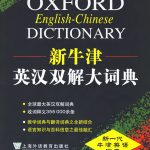 I have taught a fair amount of writing in various languages and have been on the receiving end of even more. The main problem as I see it is that your success with writing is mostly determined on how much you read, something which is tricky to do anything about as a teacher, at least in the short term.
I have taught a fair amount of writing in various languages and have been on the receiving end of even more. The main problem as I see it is that your success with writing is mostly determined on how much you read, something which is tricky to do anything about as a teacher, at least in the short term.
That doesn’t mean that a teacher is not helpful for learning how to write Chinese, but it means that a teacher can only do so much to help you. In this article, I will discuss some aspects of learning to write Chinese with the help of a friend, tutor or teacher.
I’ve recorded an audio version of this if you prefer listening instead of reading:
Just so we’re on the same page, writing here refers to combining words into sentences, sentences into paragraphs, and paragraphs into longer texts. It does not mean writing Chinese characters by hand, as that will be covered in an upcoming article. If you want to learn about writing characters instead, I suggest you head over to this article:
This article is part of a series focusing on your relationship with your teacher. I suggest that you read the introduction before you continue with this article, if you haven’t done so already. It covers what this series is about, and perhaps more importantly, what it’s not about. Here are all the articles:
- Training your Chinese teacher, part 1: Introduction
- Training your Chinese teacher, part 2: Speaking ability
- Training your Chinese teacher, part 3: Listening ability
- Training your Chinese teacher, part 4: Writing ability (this article)
- Training your Chinese teacher, part 5: Reading ability
- Training your Chinese teacher, part 6: Characters, vocabulary and grammar
Training your Chinese teacher, part 4: Writing ability
Writing is in some ways similar to speaking, at least when it comes to what a teacher can do for you in terms of feedback and corrections. However, writing is also different in many ways. To start with, it’s normally asynchronous, meaning that people don’t read what you write as you write it. An exception to this is online chatting, but more about that later.
Writing practice is also more practical and often cheaper. Since you don’t need to meet the person who gives you feedback, scheduling is not a problem, and the person can be located anywhere, including where prices are lower. There are also many services that provide free feedback in exchange for your help correcting people learning your native language (such as Lang-8).
However, writing also requires more of you as a student when it comes to discipline. For your teacher to be able to help you with your writing, you need to first write something. While you can jump on a call and have a conversation with zero preparation, this doesn’t really work with writing.
In fact, there’s a whole range of issues many of us have with writing, something I covered more in this article:
https://www.hackingchinese.com/improving-writing-ability-common-problems-and-how-to-tackle-them/
How a teacher can help you improve your writing ability in Chinese
As I said in the introduction, by far the best way to improve your writing is to read more. That’s not something anyone can do for you, though, so in this article, I will mostly focus on things a teacher can do for you.
Feedback is the most obvious thing a teacher can provide that you can’t really get on your own. I talked about how to get honest feedback in Chinese in a recent article, so I will only repeat the most important parts here.
In general, feedback is useful as a shortcut to figuring out what you can’t write. Reading is very good at giving you positive evidence of what Chinese should look like, but it’s not as good at giving you examples of what doesn’t work. This can be achieved by truly vast amounts of reading, but that is by definition very time consuming.
Feedback can help direct your attention when reading, which in turn will help to improve your writing. Gradually, you adjust your mental model of how written Chinese works, making it overlap more and more with how native speakers use it.
This is most effective when targeting a specific aspect of the language, rather than when receiving feedback on anything and everything at once.
Different types of feedback
When receiving feedback from a teacher, it’s important to know the difference between systematic errors and isolated mistakes. The first indicates that your mental model is wrong, so no matter how many times you write something, you’ll still be wrong. If you think 和 can be used to link clauses in Chinese, no amount of writing practice will fix this.
Isolated mistakes are things you get wrong, but where you actually know better, so if you wrote the same text again, you would probably be able to avoid the mistake. These are not very serious, but it’s sometimes impossible for your teacher to know the difference, so they will be marked the same.
Read more about this in this article:
How to learn from your mistakes and errors when learning Chinese
Different teachers will give you feedback in different ways, but the important thing is that you receive enough information to learn from it. This doesn’t mean that your teacher should always tell you what the right answer is, which often just leads to the student copying the correct answer without really thinking about it too much, but it does mean giving some clues as to what you did wrong and maybe why.
Improving your Chinese writing ability
In order to have something to show your teacher, you need to first write something. Ideally, this should be preceded by reading about whatever topic you want to write about, so let’s have a look at a few strategies for doing this first:
 Extensive reading – While not specifically about writing, I still want to stress the importance of reading a lot. This is the foundation of your feel for the language and what will allow you to craft sentences that not only contain the information you want, but also follow the rules and norms of written Chinese. Your writing ability will never surpass your reading ability, and any attempt to achieve that is bound to be a huge waste of time.
Extensive reading – While not specifically about writing, I still want to stress the importance of reading a lot. This is the foundation of your feel for the language and what will allow you to craft sentences that not only contain the information you want, but also follow the rules and norms of written Chinese. Your writing ability will never surpass your reading ability, and any attempt to achieve that is bound to be a huge waste of time.
- Narrow reading – This is a strategy where you read several texts about the same topic. The first text you read about a certain news event will probably be difficult, but the fifth or tenth article you read about the exact same event will be much easier. This is an excellent way of learning vocabulary relevant for a certain topic. It’s also an excellent way to learn more technical and academic Chinese!
 Focused reading – While having a similar name, this technique involves reading with a specific function in mind, such as how to describe something, how to refer to what someone else is saying, or finding various ways of not agreeing with someone. It’s not necessarily something you decide to do when reading a certain text, but more of a more general approach where you collect language that fulfils a certain function you know you need to reinforce.
Focused reading – While having a similar name, this technique involves reading with a specific function in mind, such as how to describe something, how to refer to what someone else is saying, or finding various ways of not agreeing with someone. It’s not necessarily something you decide to do when reading a certain text, but more of a more general approach where you collect language that fulfils a certain function you know you need to reinforce.
The above strategies are more about reading than writing, so let’s turn to actual writing tasks now.
- Writing summaries
 – This can be combined with all of the above strategies, but work particularly well with narrow reading. After you have read all those texts about a topic, write your own summary! You now have the exposure you need to have a chance of doing this well. When you write a summary, it’s of course okay to use the same words as the originals do (that is after all part of the point), but avoid copying longer chunks. When you’re done, turn to your teacher for feedback.
– This can be combined with all of the above strategies, but work particularly well with narrow reading. After you have read all those texts about a topic, write your own summary! You now have the exposure you need to have a chance of doing this well. When you write a summary, it’s of course okay to use the same words as the originals do (that is after all part of the point), but avoid copying longer chunks. When you’re done, turn to your teacher for feedback.  Translating from another language – While translating something is not exactly the same as writing something from scratch in Chinese, it still has certain merits. For example, since you can’t choose what you want to say (that’s already decided in the original text), you’re forced down paths you’re not used to, diversifying your practice. Translation is also nice because having a finished text means you don’t have to think about what to say, how to compose the text and so on, but can focus more on the sentence level. Naturally, you shouldn’t always do this. If you’re not already a decent writer in Chinese, I suggest you check this guide. Once you have a translation, discuss it with your teacher. This works very well in small groups too, where each student brings her own suggested translation and they are compared and discussed.
Translating from another language – While translating something is not exactly the same as writing something from scratch in Chinese, it still has certain merits. For example, since you can’t choose what you want to say (that’s already decided in the original text), you’re forced down paths you’re not used to, diversifying your practice. Translation is also nice because having a finished text means you don’t have to think about what to say, how to compose the text and so on, but can focus more on the sentence level. Naturally, you shouldn’t always do this. If you’re not already a decent writer in Chinese, I suggest you check this guide. Once you have a translation, discuss it with your teacher. This works very well in small groups too, where each student brings her own suggested translation and they are compared and discussed. Chatting online – As I mentioned earlier, chatting can be a great way of easing yourself into Chinese writing. It has the benefit of being more like speaking: shorter, spontaneous and synchronous. You still have some time to think about how to write something, but the informal nature of a chat will make it feel less daunting. While it can take some self-discipline to sit down and write an essay, chatting with someone online requires much less effort. The language itself is also closer to spoken Chinese, which makes the transition still easier. You can either get feedback live while chatting, or ask your teacher to give you feedback on a finished chatting session.
Chatting online – As I mentioned earlier, chatting can be a great way of easing yourself into Chinese writing. It has the benefit of being more like speaking: shorter, spontaneous and synchronous. You still have some time to think about how to write something, but the informal nature of a chat will make it feel less daunting. While it can take some self-discipline to sit down and write an essay, chatting with someone online requires much less effort. The language itself is also closer to spoken Chinese, which makes the transition still easier. You can either get feedback live while chatting, or ask your teacher to give you feedback on a finished chatting session.
Conclusion
The most important thing for improving your Chinese writing ability is to make sure that you are reading enough. If you don’t do this, a teacher will not be able to help much with your writing. Beyond extensive reading, you can read with writing in mind, and then go through what you have written with a teacher, highlighting areas you need to improve.
Some of the problems you encounter will be mere slips or even typos, but others will hint at systematic errors in your mental model. Feedback will help guide your attention and efforts, enabling you to take your Chinese writing to the next level!


